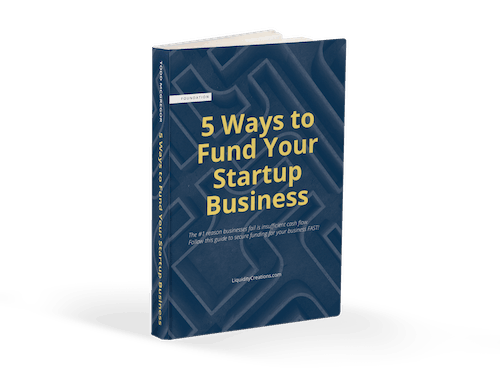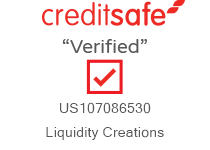In the middle of every difficulty lies opportunity.
Albert Einstein

Do you have questions like
How do I establish business credit for the first time?
or
How do I establish credit for my LLC?
Well, Read On!
In this article you will learn the basics on how to establish business credit for your business without any personal risk.
Also, at the end of this article we have included some of the more popular questions we get when discussing how to build business credit. Please check those out.
First we need to discuss what personal credit is and how it differs from business credit.
Let’s get going!
Personal Credit Defined
Just because you have a social security number doesn’t mean that you have a credit profile.
For example, every child in this country is born with a social security number, but they don’t actually establish credit for that social security number until they apply for new credit, receive an approval, and that credit is reported to the personal credit reporting agencies.
When credit is applied for approved and reported, then and only then will that individual have established credit.
Your accounts are reported to the consumer agencies including Experian, Equifax, and TransUnion, you’ll need to wait six months, FICO will then issue that consumer and actual credit score.
Here's a deeper look at the process.
- First credit is applied for
- Second, the applicant is approved for credit that reports to the credit reporting agencies.
- Thirdly, the credit is reported and trade lines are now established.
- Fourthly, as multiple accounts are reported, a credit profile is established.
- Finally due to the reporting of trade lines and establishment of a credit profile, enough information is now available for a credit score to be issued.
Now that we’ve looked at how the process works, let’s look deeper into how it starts.
Let’s imagine that you’re starting over.
(That would be nice! Right?)
You have no trade lines reporting, no credit profile or score established.
So if you walked into a bank and tried to get a credit card, car loan, mortgage, or other financing, your credit would be pulled. But due to a lack of credit, you would be denied financing.
All types of financing!
If you were to walk in and apply for store credit, like Staples, Lowe’s, Home Depot, Walmart, Target, or any other retailer, you would also be denied for the same reason, a complete lack of credit.
If you were to save up a couple thousand dollars and obtain a secured card or two and wait until those accounts reported, then you would have reported trade lines and an established credit profile complete with a credit score.
Now, you go into a store to get credit with your newly established credit profile and score, as long as you paid your bills on time, you should get approved.
Although, if you went into your bank to get a $5,000 credit card, you would still probably get declined because you don’t have enough established personal credit.
What is Business Credit?
Fundamentally, consumer and business credit work exactly the same way.
Just because you have an Employment Identification Number does not mean you have established credit.
Just the same as you won’t have established consumer credit just because you have a social security number.
So if you do walk into a bank and try to get cash credit using your EIN with no credit established, you will always get denied.
Guaranteed!
Now, if you have solid personal credit, you can use your personal credit to “Co-Sign” for your business. This is called a Personal Guarantee and you don’t want to do that.
The whole point of creating a business entity in the first place is to separate your personal assets from your business risks.
(If you need to set up an entity, I recommend MyCorporation.com. It’s a quick and easy process, many times the naming of your business is the hardest part.)
This is why so many people fail at building business credit. They apply for the wrong type of credit first, get denied, then are convinced that business credit doesn’t work.
If you apply for credit with stores and banks and have no established credit profile for your Employment Identification Number, you will be denied financing and credit building.
How do you build business credit?
To build corporate credit, you can’t start with the roof!
You have to start with the foundation first and build off of it. You can’t start with store or cash credit from your bank.
If you do, you’ll get denied 100% of the time.
First you must build trade lines that report to the business credit bureaus. That way you’ll have an established credit profile. Then you’ll obtain a business credit score and finally with an established business credit profile and score, you can start getting revolving store and cash credit.
How Much Credit Can I Get for My Business?
Let’s look at some well known companies business credit profiles.
Facebook already has 40 business credit trade lines established with Experian.
Microsoft now has over 130 business credit trade lines established with Experian.
Apple has 138 business credit trade lines established with Experian.
Walmart gets 80% of their company cash injection from business credit, which is why they have a whopping 513 trade lines reporting to Experian.
Every highly successful company in the United States has business credit.
Walmart for example, has a high credit limit of $50 million reporting, but none of these companies started at that limit and were given this many trade lines. All of them followed a process to establish their corporate credit and that credit grew with them as their business grew.
Let’s look at some of the most well known entrepreneurs. Steve Jobs, Bill Gates, Mark Zuckerberg, Richard Branson, obviously none of them were recently personally guaranteeing their business debts when they went out and got a credit line, they didn’t need to provide their social security number and personally guarantee the debt to get approved.
Many people might think that they get credit because they’re big companies, but the reality is the issuing of credit doesn’t work that way and never has these entrepreneurs get credit without a personal guarantee because their company’s credit can stand on its own, not just because they have an EIN.
The real key to getting business credit is to establish a solid credit profile and score that can stand on its own.
You don’t need to supply your social security number. Once you do this, your business can then be approved for credit with no PG or credit check, just like every other highly successful company in this country.
how do you start a business credit profile?
Most consumer credit starts with secured credit cards or an account that has a well-established co-signer, but co-signed accounts and secured accounts really aren’t popular or widely used in the business world.
We discussed briefly how you as the owner can act as a co-signer, but in that case you are using your personal credit to guarantee the credit line. This is not something you want to do. You also can’t have another business co-sign for your business.
As for secured cards, Wells Fargo does have a Secured Business Credit Card and this may be an option for one of your first accounts.
Before you lock up $2000 on a secured card, let’s talk about some other alternatives.
Vendor credit, the secret ingredient for any business to start to get approved for real business credit.
Vendor Credit lines are the key to building a business credit profile.
Most business credit starts with vendor accounts.
Vendor accounts are accounts that typically offer terms such as NET 30 instead of a revolving line of credit. If you get approved for $1,000 in vendor credit and use all $1,000 of it, you’d need to pay your balance within the term agreed to. On a NET 30 account, you have 30 days to pay the balance owed.
In contrast, a NET 60 account would need to be paid in full within 60 days.
Unlike with revolving accounts, you have a set time, you must pay back what you borrowed on the credit you used.
How to build your Business Credit Foundation
To start your business credit profile the right way, you need to get approved for vendor accounts that report to the business credit bureaus.
Once you’ve done this, you can then use the credit, pay back what you used, and the accounts get reported to Dun and Bradstreet, Experian or Equifax. Then you have trade lines and established credit profile and an established credit score.
Using your newly established business credit profile and score, you can then get approved for store credit and eventually cash credit without needing to supply your SSN or personal guarantee.
This is possible because now your EIN credit profile is established and can stand on its own.
So if you leave your social security number off of the application, the Credit Issuer then pulls your EIN credit, sees a solid profile and score and can then approves you for real revolving credit.
One thing to keep in mind is that when you follow the correct steps to building business credit, not all retailers will approve you just because of your credit profile and score.
Stores such as Home Depot or Best Buy also have a time in business requirement possibly requiring you to be in business three years or more to get no personal guarantee credit. Most retailers will approve you without these requirements.
So now you know that any business can get business credit, but before you start getting revolving credit at stores and cash visa type credit from sources like banks, you first must have trade lines reported.
So basically you need credit to get credit.
The oh so popular lending paradox that so many people get lost in, but there’s no need to get lost or stuck.
Building business credit is actually quite simple. Once you understand that there is a path, you must follow a certain order of credit to apply for it. Once you follow this order and get your profile and score started, then more and more sources will issue you more and more credit.
Stepping up to Tier Two Business Credit
When you have 10 or more trade lines, the real world of business credit opens up and you get the big reward.
Without question, getting your initial credit is the hardest part. We now know that we need vendor accounts to start a business credit profile and score. You’ll actually need a total of five payment experiences reported to start getting revolving store credit.
A payment experience is the reporting of an account to a business credit bureau, so if you get approved with a vendor who reports to Dun and Bradstreet and Experian, that would count as two payment experiences.
If that account only reported to D&B, that would be one payment experience. You’ll need five payment experiences to start getting approved for revolving store credit cards using only your EIN for approval.
These are credit cards at places like Best Buy, Lowe’s, Staples, Amazon, Dell, Apple, Walmart, and so on.
You’ll then need a total of 10 payment experiences to get approved for cash credit such as Visa and Mastercard type credit, and to get that cash credit, you’ll also need to have one of those payment experiences. Have a $10,000 limit or higher at least to start getting nice limits on the cash credit you secure.
Now you’re starting to uncover the secret formula for building business credit.
So let’s revisit what not to do.
Don’t apply for store credit first!
You’ll get denied!
Don’t start with cash or bank credit first.
You’ll get denied!
Don’t put your SSN on the application to start building your business credit. They’ll pull your personal credit and require a personal guarantee.
To build business credit the right way, You must first start with vendor accounts.
Then when you had the necessary reported payment experiences, you can move on to store credit. Then apply for cash credit.
You can get vendor credit lines immediately.
Start now!
It’ll take those accounts 30 to 90 days to report, giving you a profile and score. With that profile and score, you can then start getting store credit. In a total of four to six months after starting the process, then you can start to get cash credit.
90% of vendors in this country do not report the credit they issue to business owners.
This is why so many business owners think they have established business credit when they haven’t. We provided a list of vendors who do report to the business credit bureaus below.
This is the hardest and most challenging part of building business credit, but once you get past this major hurdle, it’s much easier to take the rest of the steps to get corporate credit.
Let’s take a look at some true starter vendors. You must start a business credit profile and score with starter vendors.
Today
Establish Business Starter Vendor Accounts
Choose 5 Starter Vendors from the list below. Register your accounts with each.
Day 1
Order Products or Services
Place initial orders at each of your selected vendors.
30 - 90 Days Out
First Accounts Report
It will take your initial vendors 30 – 90 days to begin reporting to the credit agencies. This is where it gets exciting.
90 - 120 Days
Your Score is Established
You have 5 Starter Vendor Accounts reporting on your business credit profile. You are ready to move to Credit Tier 2 – Store Credit!
4 - 6 Months out
Business Credit Tier 2
You can start applying to stores like Lowes, Home Depot, Staples, and Best Buy for their NET 30 accounts.
Starter Vendors
Starter vendors are ones who will give you initial credit even if you have no credit, no score or no trade lines.
Now, most stores like Staples will not give you initial starter credit, so don’t even try applying.
Take a look at some actual true starter vendors.
Laughlin Associates
- They focus on corporate setup and compliance.
- Reports to Experian.
- Only a 411 listing and an EIN number are required for approval.
- Accounts report to the business credit bureaus in 30 to 60 days
- Offer NET 30 terms.
Summa Office Supplies
- True starter vendor account.
- They provide information products and office supplies.
- They report to Equfax.
- They currently have no approval requirements.
- They report to the business bureaus in 30 – 60 days
- Offer NET 30 terms.
Quill Office Supplies – (Popular starter vendor)
- Offers office packaging and cleaning supplies.
- Reports to Dun & Bradstreet
- You must place initial order first unless D&B score is established.
- Usually they put you on a 90 day prepayment schedule initially before approving you for NET 30 terms.
- If you order items each month for three months, they typically will approve you for a NET 30 account.
eCredable
- Starter vendor that reports utility payments.
- They report to Transunion.
You’ll need to connect your utility accounts to your eCredable account. Then make your payments as usual. eCredable will report your payments as they are made.
Reliable Office Supplies
- Sells office supplies and promotional products.
- They report to D&B, Experian, and Equifax
- NET 30 Terms
To get approved. Place an initial order, then request your order be invoiced or billed to your company. They will pull your business credit if you are not approved. Keep ordering and requesting to be invoiced or billed. The more orders you place, the better your chance of being approved for NET 30 terms.
ULine
- Sell shipping, packing and industrial supplies.
- They report to D&B.
- You must have your DUNS number for approval.
- They will ask for two references and bank reference.
- Your first few orders might need to be prepaid to initially get approved for NET 30 terms.
Conclusion
Remember, you’ll need a total of five vendor accounts to start getting store credit.
We just supplied you 6!
More than what you’ll need so you have plenty to get started with. Find the credit you want to use. Apply without using your SSN.
You will get approved!
Start using your credit and pay your bills early. If you followed the steps in this article, you should be well on your way with establishing business credit.
Check out my YouTube channel and subscribe for other tips, including ones about setting up your business credibility.
This is important!
Now get started right away and keep going. Building business credit is a never ending process that can take you and your business to the highest peaks of business success.
At Liquidity Creations, we are dedicated to helping small businesses and startup entrepreneurs get access to needed working capital. This article is a basic plan for getting started. Your business may need some additional assistance to get the ball rolling. It’s better to save time up front than to realize you had some errors and can’t go back to change them.
Contact us today to see how we can’t help. You can use the chat box, call, click the button below, or send an email. We’d love to hear from you.
Frequently Asked Questions
When it comes to building business credit there are many areas that can be confusing. Here are the top questions we receive almost on a daily basis.
The main purpose of building business credit is to complete the separation of personal and business liability protection. By establishing a business entity such as an LLC, S-Corp, or C-Corp you create the first step of protection.
As a sole proprietor, you do not have a separate business entity to establish a business credit profile. You are fully liable for all debts and have limited options for financing.
If you have established business credit according the rules we have laid out in this article, then you will establish business credit for your business.
The beautiful part is that it will be on your businesses EIN number and not attached to your personal credit.
So, a short answer is no, it will not affect your personal credit, but it does benefit you personally due to the fact that you will no longer need to put business expenses on your personal credit cards.
This allows you to manage your personal credit much easier since typical personal expenses are much lower than business expenses. The two biggest factors that affect personal credit are utilization and paying on time.
Keep your balances at or below 30% of your total credit limit and pay your bills on time every month.
Check out the timeline in this article. You can see that building business credit is much faster than building personal credit. Within 30 days yo can have your first accounts established and on your way to higher credit limits.
You must first establish credit at the Tier 1 account level, then Tier 2 (about 6 months), then into Tier 3 where you can get Cash Credit such as Mastercard, Visa, and other similar bank issued cards. Tier 4 (12 mos) is cash loans for your business of $150k and up.
As long as you have your business “credibility” foundation set up correctly, you should be able to build business credit easily with a bad personal credit score.
Your business credit is not attached to your personal score, so your personal credit score does not matter. If you are in this situation, contact us, we can get you going in the right direction.





